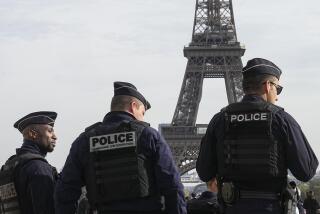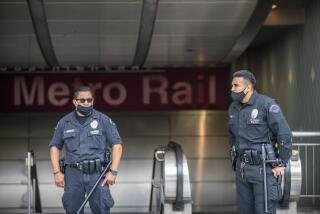Thin Blue Line Faces Crime, Kosovo-Style
- Share via
PRISTINA, Yugoslavia — Garry Day and Ray Russell fully realized the extent of the lawlessness in postwar Kosovo three weeks ago, the day their downtown apartment here was burglarized.
It wasn’t so much the burglary that bothered the two men. It was being shaken down at gunpoint by two other criminals as they waited for NATO’s military police to respond to the break-in.
The extortionists, who were demanding protection money from the American and the Canadian to guard against future crimes, didn’t seem to care that their victims stood before them in police uniforms.
“I couldn’t believe it,” said Day, a veteran police officer from southern Ohio and a key figure in training and establishing the fledgling international police force that will take over the streets from the NATO-led troops of the Kosovo Force, known as KFOR.
But after a moment of staring slack-jawed in dismay, the officers told the bad guys to beat it. For whatever reason, they listened and fled. Day chased after them, not with his gun--because he’s not yet authorized to carry one--but with a camera, snapping away in hopes of capturing evidence for prosecution.
Welcome to life on the beat in Kosovo, where murder and arson are the order of the day, where thieves and drunken drivers are considered too petty to pursue, where traffic signals are flagrantly ignored, and where parking is never a problem: Just pull your car up over the nearest curb and leave it.
All this, however, is about to change.
In the past week, hundreds of civilian police officers from around the world began arriving in Pristina, the provincial capital, to join the United Nations International Police Force.
Eventually, perhaps within two to three weeks, these civilian cops from 43 countries will be issued weapons and given arrest powers and will take over the job of policing Kosovo’s mean streets from the soldiers and military police who do it now.
First on the agenda for the new officers is making sure they can speak English, drive a car and fire a weapon. After a week’s training, the officers will begin patrolling, without guns at first, with armed KFOR troops. Then, they’ll be on their own.
That will happen when “enough” of the 3,500 officers who will make up the international force arrive, Day said. How many is enough, he said, will be a joint decision by leaders of the U.N. and KFOR and Sven Frederiksen, the Danish commissioner of the international force.
Since KFOR occupied Kosovo--a province of Serbia, Yugoslavia’s dominant republic--on June 12, military investigators have had to contend with a tidal wave of killings, arson, looting and other crimes, including the slaying of 14 Serbian farmers last month. When the baton is passed, the civilian police will take over investigation of such crimes.
Already, police officers from Kenya, Germany, the U.S., Canada, Argentina, Nepal and Pakistan have arrived in Kosovo and are streaming in and out of the new U.N. police building amid honks, waves and words of support from the locals. Some officers are paid by their departments at home and receive a living allowance from the U.N. Others, including an expected contingent of 450 officers from the U.S., must resign from their jobs or take a leave of absence. The Americans are being paid between $85,000 and $100,000 by a private company that contracts with the U.N. for a yearlong commitment.
Most of the international officers are wearing uniforms from their home jurisdictions--and U.N. arm patches--but the American officers will all sport generic dark blue uniforms with an American flag on the sleeve.
As welcome a presence as the international police will be, the U.N. cops are only a quick fix. The real ranks of the future Kosovo P.D. can be found any day standing in long lines outside a building that two months ago most ethnic Albanians would have done anything to avoid: the former headquarters of the Serbian police.
Fadil Hoti, 20, of the nearby town of Podujevo, is a fairly typical applicant. An ethnic Albanian in a Serb-run society, Hoti said he had to secretly attend school in the basement of a friend’s house. He didn’t have much of a resume because the Serbs had given all the best jobs to their own, he said.
“Now, we want to have our own police and our own state, and I want to be a part of it,” Hoti said.
Day, whose duties include directing recruitment for the civilian force, said applicants will be selected based on their level of education, any relevant special training and past police experience. He said youth also would be considered a positive factor.
Day also said experience in the Kosovo Liberation Army, the Serbian police force or the Yugoslav army will be viewed as just that--experience. Ethnic Albanians would view with great suspicion any former members of the Yugoslav army or Serbian police, many of whom carried out the “ethnic cleansing” campaign of Yugoslav President Slobodan Milosevic in the province. Serbs, on the other hand, consider members of the KLA to be terrorists.
“We do not flag, target or pick out organizations to be excluded against,” Day said.
The first class of Kosovar police cadets is set to start training this month. After five weeks, the cadets will be paired with international officers for extensive on-the-job training, including an emphasis on respect for human rights. They will be fully certified after three years.
Such pairings might result in a young man like Hoti, who has no police experience, being partnered with someone like soon-to-be-retired Los Angeles Police Department Lt. Mike Schaffer, a 25-year veteran.
Schaffer, who left behind a wife and two children in the Southland, said he was moved by news coverage of events in this battered province and thought he could make a difference.
After just a few days spent walking the streets of Pristina in his dark blue uniform, he said he’s sure he made the right decision.
“The kids come up to you and say, ‘U.S.A.! U.S.A.!’ and you’re the police,” Schaffer said. “I can’t tell you how that feels; that’s instant gratification for a police officer.”
But Schaffer’s experience on the streets of L.A., most recently as a narcotics officer, will probably come in handy if the honeymoon with ethnic Albanians fades. He doesn’t seem rattled by the crime wave in the province.
Just the other night, a bomb--or possibly a grenade--exploded at a Serbian Orthodox church a few blocks from the hotel where Schaffer is staying, waking him up.
“To tell you the truth, when I didn’t hear any shooting afterward, I just rolled over and went back to sleep,” he said.
More to Read
Sign up for Essential California
The most important California stories and recommendations in your inbox every morning.
You may occasionally receive promotional content from the Los Angeles Times.











